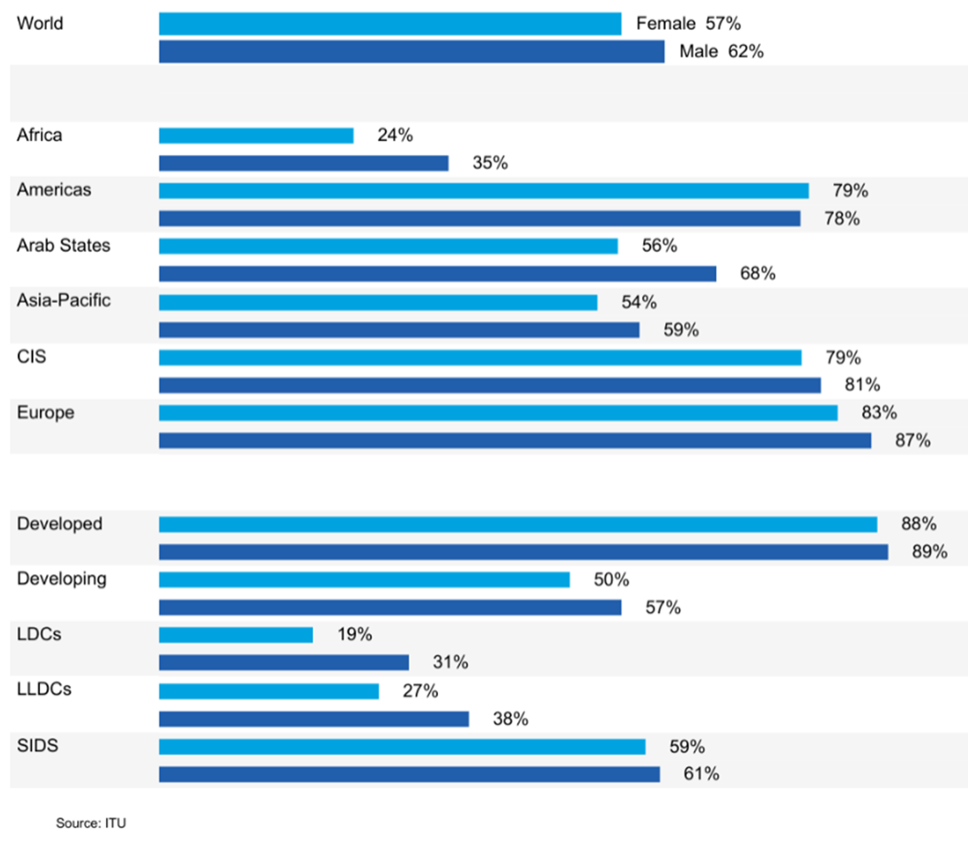By Shamika N. Sirimanne, Director of Technology and Logistics, UNCTAD and Ratnakar Adhikari, Executive Director, Enhanced Integrated Framework
© 2015 Riccardo Mayer/Shutterstock | African woman working on her laptop computer
The theme for International Women’s Day, 2023, aptly chosen by the United Nations, is “DigitALL: Innovation and technology for gender equality”. Within this domain, digital entrepreneurship can be a powerful avenue for women’s inclusion in the digital economy with new business opportunities, efficiency gains and better access to markets and global value chains.
While the digital economy is a very broad category, according to the International Finance Corporation, women could add over $300 billion to e-commerce markets alone in Africa and South-East Asia between 2025 and 2030.
There are three key advantages that e-commerce offers to women. First, it offers lower barriers to entry than traditional brick-and-mortar businesses. This means that women entrepreneurs can start their businesses with lower start-up costs and without the need for a physical storefront, which can be a significant advantage. Yvette Uwimpaye, a young entrepreneur from Rwanda, noticed the inconvenience that people faced while shopping at multiple markets. To address this issue, she developed Murukali, a simplified online shopping platform that saves time and money. With start-up costs as little as $1,155, she managed to launch the platform that is transforming the shopping experience in Rwanda.
Secondly, it can enable women entrepreneurs to reach customers all over the world. Women entrepreneurs can leverage this global reach to expand their customer base and grow their businesses beyond their local markets. Birame Sock, an entrepreneur from Senegal, has taken advantage of this opportunity as founder of Kwely, an online B2B wholesale sourcing marketplace for products made in Africa. The online platform gives buyers around the world access to quality and unique products made in Africa that meet international standards.
And thirdly, it offers a degree of flexibility in terms of work hours and location. Women entrepreneurs who may have caregiving responsibilities or mobility constraints can greatly benefit from digital technologies.
Despite these opportunities, women entrepreneurs are much less represented in the digital economy than men. This gap translates into missed economic opportunities and may aggravate existing gender inequalities.
To understand how to increase women’s participation in e-commerce and the digital economy and reduce the digital gender divide, we first need to understand the specific needs and constraints that women face as entrepreneurs, as well as the enabling factors that can further support the growth of women-led digital businesses.
Bridging the gaps
Access to a reliable and affordable internet connection is the bedrock of the digital economy. While the gender gap in internet usage has shrunk globally, it remains significant in many developing countries, particularly in the least developed countries (LDCs).
Globally, 57% of women used the internet compared with 62% of men, according to the International Telecommunication Union (ITU). Of the estimated 2.7 billion people currently unconnected, the majority are women and girls. And in the LDCs, only 19% of women use the internet as opposed to 31% of men.
Meaningful connectivity needs to be accompanied by relevant skills. Compared to men, women have limited opportunity to master more advanced technology and digital skills, which underpin the possibility of workers and entrepreneurs to leverage digital tools. According to UNESCO, only 35% of Science, Technology, Engineering and Mathematics (STEM) students in higher education globally are women.
But for many entrepreneurs in developing countries and the LDCs, it is basic digital literacy that is most needed to engage in the digital economy. This encompasses skills that enable the direct use of technologies, such as good comprehension of emerging technologies and their applications, as well as knowledge of digital privacy and security.
In addition to these challenges in the digital world, barriers that women entrepreneurs continue to face in the analogue world still need to be addressed. These include limited access to resources, difficulties in obtaining credit, cultural inhibitions and gender stereotypes.
Championing women’s causes
Unless we have more women in leadership roles, only men will define how we communicate, work, educate, run businesses, provide healthcare and educate. Bringing the voices of women who are active players in the digital economy to the policy-making table is essential. They can help us design relevant and effective policies to address specific obstacles that women face.
There are several initiatives underway to address these challenges. For example, UNCTAD's E-Trade for Women initiative is promoting the engagement of women entrepreneurs in developing countries in designing relevant and effective policies to address the obstacles that women face. It is also inspiring more women to venture into digital entrepreneurship. So far, the initiative has reached founders of almost 200 women-owned digital businesses in more than 40 developing countries.
The ITU, EIF and EQUALS Global Partnership has also launched a joint project titled Tech as a driver of Women's Economic Opportunity to enhance the digital ecosystem and build digital skills for women in the LDCs. In support of Girls in ICT 2020-2022 and of the EQUALS Global Partnership, the Talking Tech series features conversations between girls/young women in tech.
By raising the profile of successful female business leaders and providing demand-driven capacity-building support, these initiatives are not only fighting deeply rooted stereotypes that hold women back but also helping them to address binding constraints.
Ways forward
Closing the digital divide is a prerequisite to unlocking women's potential in the digital economy. Governments must take steps to improve digital connectivity and ensure that access to affordable internet is considered a citizen's right – not a luxury.
In many developing countries, internet access is prohibitively expensive, making it difficult for women entrepreneurs to operate in the digital space. Governments must work with private sector partners to expand broadband coverage in underserved areas and promote policies that encourage greater competition in the telecommunications sector.
Enabling women entrepreneurs in developing countries to partake in the digital economy calls for a multifaceted approach, necessitating collaboration among governments, businesses and civil society. This approach should aim to provide women with access to digital resources, education, skills and financial support.
Enabling more women entrepreneurs to take advantage of the growing digital economy, break down barriers and thrive in the global marketplace is critically important to fully harness digital opportunities for sustainable development. By investing in women's participation in the digital economy, we can create a more inclusive and equitable global economy that benefits everyone.
This article was first published by the World Economic Forum


